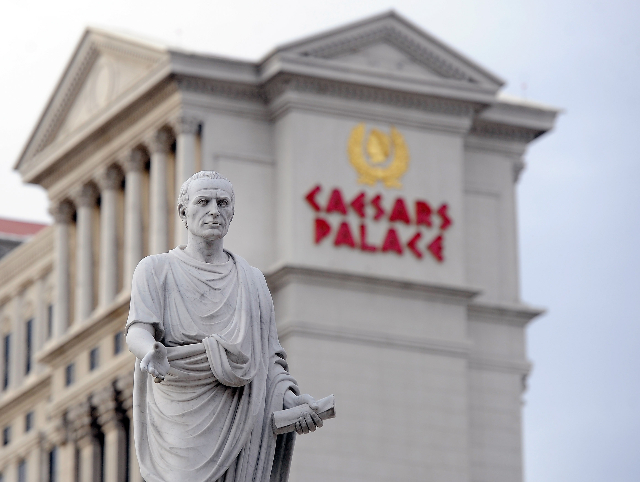Caesars to pay $9.5 million in fines to settle money laundering violations

Caesars Entertainment Corp. will pay fines totaling $9.5 million for violating federal money laundering rules at Caesars Palace, government agencies said Tuesday.
The casino company has agreed to pay an $8 million civil penalty to federal authorities for repeated violations of the Bank Secrecy Act. It has also agreed to a stipulated settlement with Nevada gaming regulators and will pay a $1.5 million fine to the state.
In a statement, the Financial Crimes Enforcement Network of the U.S. Department of the Treasury (FinCen), said Caesars Palace agreed to periodic external audits and independent testing of its anti-money laundering compliance program, report to FinCen on mandated improvements, adopt a rigorous training regime, and engage in a “look-back” for suspicious transactions.
The violations involved predominately “wealthy individuals from overseas” and occurred inside Caesars Palace’s high-end gaming salons. The incidents were uncovered by FinCen during a 2012 examination.
“Caesars knew its customers well enough to entice them to cross the world to gamble and to cater to their every need,” FinCen Director Jennifer Shasky Calvery said in a statement. “But, when it came to watching out for illicit activity, it allowed a blind spot in its compliance program. Every business wants to impress its customers, but that cannot come at the risk of introducing illicit money into the U.S. financial system.”
In a court filing, FinCen said Caesars Palace “openly allowed wealthy patrons to gamble anonymously” in the Strip resort’s private gaming salons, often wagering more than $1 million on a single visit.
FinCen said elevated money laundering risks are present in the salons and Caesars “failed to impose appropriate anti-money laundering scrutiny.” The actions allowed “some of the most lucrative and riskiest financial transactions to go unreported.”
FinCen said Caesars failed to adequately monitor transactions coming from Asia through its branch offices for suspicious activity, such as large wire transfers. The agency said Caesars Palace “maintained highly deficient internal controls” on the private gambling salons.
“These failures compromised Caesars, and exposed the casino and the U.S. financial system to illicit activity,” FinCen said.
The settlement has to be approved by the U.S. Bankruptcy Court in Chicago. Caesars Palace, the company’s flagship Strip resort, is the only Las Vegas property included in the bankruptcy reorganization of Caesars Entertainment Operating Co., the casino operator’s largest division.
In an emailed statement from its outside financial public relations firm, the company said it agreed to the settlement.
“Since the time of the examination, Caesars Palace has made substantial improvements to every aspect of its Bank Secrecy Act/anti-money laundering compliance program and continues to enhance the program,” according to the statement. “The entire Caesars organization is committed to full compliance with the requirements applicable to casinos and to taking effective risk-based measures to prevent and detect money laundering.”
Nevada Gaming Control Board Chairman A.G. Burnett said Tuesday the company agreed to pay a $1.5 million fine to the state, admitting to the federal allegations. Burnett said a stipulated settlement is expected to be filed by the agency this week. The agreement will have to be approved by the Nevada Gaming Commission.
The settlement ends a two-year-long FinCen investigation for alleged violations of the Bank Secrecy Act.
In quarterly filings with the U.S. Securities and Exchange Commission, Caesars first announced it was under the FinCen inquiry in October 2013. In May, Caesars said it was in discussions with government agencies to negotiate a settlement and pay a multi-million-dollar fine.
In the past few years, FinCen has focused on anti-money laundering policies and procedures, with a particular interest in the gaming industry. FinCen officials criticized casino companies for not sharing information across their business units. The Justice Department has been concerned that criminals use casinos to move large sums of money.
In August 2013, Las Vegas Sands Corp. struck a deal with federal prosecutors and paid a settlement of $47.4 million to avoid criminal charges in connection with allegation of money laundering activities at The Venetian in 2006 and 2007. In March, FinCen imposed a $10 million civil penalty on Trump Taj Mahal in Atlantic City.
In June, FinCen fined the Tinian Dynasty Hotel & Casino in the Northern Mariana Islands $75 million for allegedly operating with weak anti-money laundering controls and failing to report suspicious activity to authorities.
Contact reporter Howard Stutz at hstutz@reviewjournal.com or 702-477-3871. Find him on Twitter: @howardstutz